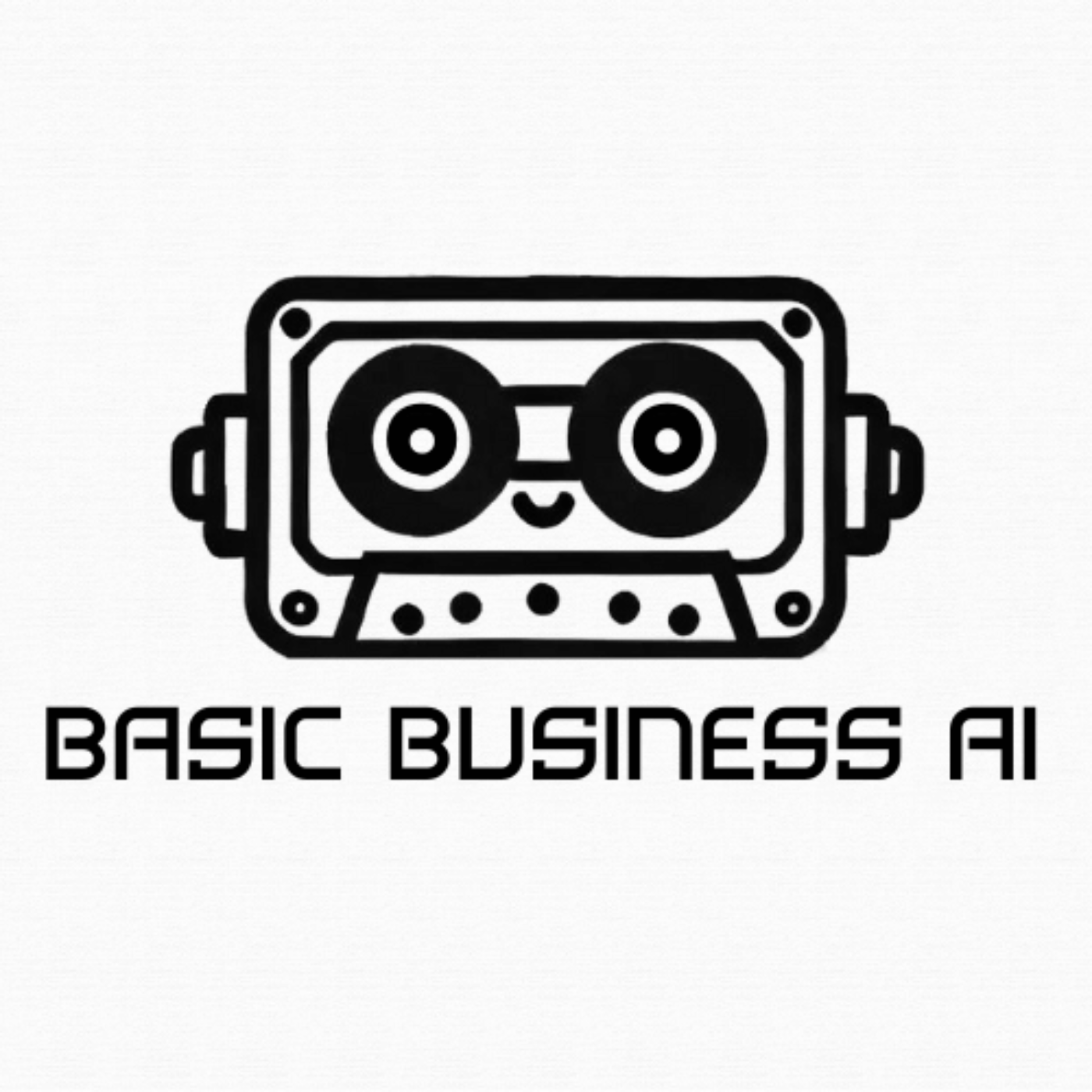Episode Transcript
[00:00:00] Speaker A: Welcome to Basic Business AI, a podcast dedicated to simple AI strategies for businesses who don't want to get an advanced tech degree or hire some marketing bro. I'm your host, William Downs. We bring on regular business owners like you and me to discuss practical strategies, ideas and perspectives about AI without getting too far into the weeds of the tech bb. AI is sponsored by anabots. Did you know companies that respond to customer inquiries in less than 1 minute have a 400% higher chance of closing the deal? Our AI powered assistants have an average response time of just 5 to 7 seconds, meaning you can close more sales without generating more leads. No tech skills are needed and you can get started in less than five minutes. Go to anabots AI to learn more. Once more, that's anabots.
Today's guest is Craig Andrews. Andrew Craig is a principal ally and founder of marketing agency Allies For Me. Using a proven method that mimics the stages of courtship, Allies For Me helps companies find strangers and convert them into high paying customers.
He talks about how a first time offer is like a coffee date that accelerates high ticket sales. So, Craig, hello, how are you?
[00:01:21] Speaker B: Well, I'm doing great. I'm doing great, you know, and it's, it was funny when you were talking about anabots and you really triggered something in me because everybody's like, I need more leads, I need more leads. I'm like, no, you need to make better use of the leads that you have. You need to close more of the leads that you have. And you're so right that being able to respond quickly is such an incredible thing. And you know, when we're doing like high ticket, when you're doing high ticket things, the number one thing that shuts that down is asking somebody to buy your high ticket thing. And that's why we're a big fan of first time offers, is it gets them engaged like a coffee date. So anyway, you just. When you were talking about making Closing more of the leads you have, that just really resonated with me. I love it.
[00:02:09] Speaker A: Yeah. Yeah. Well, thank you. Yeah, that's something that's, yeah, that's key to the company that I'm working with, with anabots. And this podcast is really about how to help people with that. And we're specifically here on this podcast talking about AI. And I know from talking to you, you use AI in all kinds of different ways, maybe just as a general start.
How is AI reshaping the future of your industry?
[00:02:40] Speaker B: You know, I call AI the underpaid graduate research assistant that I give all these crummy tasks to.
And it doesn't complain. It gets them done.
It's. There are things that can't replace. So when we're, when we're doing, you know, when we're crafting like something we call an irresistible story, I actually have a GPT for your audience to make that. It's never quite the same as when we write it ourselves. And.
But you know, I find, I think for me the greatest value that I get out of AI. It's two things. One is I call it the Great Summarizer. I can give it a ton of information and ask it what I should believe or what I should know or what I should think about that. And it comes back brilliantly. I have a podcast and I use it to, I feed it a transcript and it comes back with five potential titles for the podcast. It comes back with a summary of the podcast, you know, the show notes, and it comes back with a bullet list of key points with timestamps and takes less than 10 seconds.
And so it's great at summarizing. That's one thing that I love it for. The other thing that I really love AI for is image generation. You know, it lets me create images that were just never available before and I can generate them in the color scheme of the brand that I'm working with.
[00:04:12] Speaker A: Yeah, so what, so what tools do you use to create images? Are you using Mid Journey? What's your favorite image tool?
[00:04:21] Speaker B: I use both Mid Journey and chatgpt. And you know, there's trade offs, you know, there's some, you know, there's a lot that I like about Chat GPT Mid Journey. Maybe I'm just getting to learn it. There's there some things I, I like about it a lot.
You know, for one, if I want to illustrate, you know, if I want an image of a real person, I can do that Mid Journey, whereas that's against the rules for Chat GPT.
[00:04:50] Speaker A: Oh, right. Yeah.
[00:04:53] Speaker B: But the, you know, here's an example. The, I'm in this little mastermind group and we have this Australian in there and he kept talking about, you know, from A to Z. From A to Z. I'm like, who's Zed? I say, he sounds like some, some hillbilly in overalls that, that does unbiblical things to his pig. And, and so I actually used Mid Journey to create an image that illustrated that. And ChatGPT basically called me a bad person, said, sorry, do that for you.
[00:05:29] Speaker A: That's funny. I asked, I think it was Claude to. I had had A discord conversation. And I was in like a discord group and this guy I thought was being a little bit rude and I basically was like, well maybe I'm not like seeing it right now. I basically told Chat GPT, I took a bit of this transcript and I was like, rate these people based on rudeness level. And it was like, you shouldn't do that. And I was like, oh, ok. Yeah, it's like you shouldn't reduce people down to a number. I was like, okay, fair.
[00:05:59] Speaker B: Yeah, I, and I get it. I think that's where, you know, I think that's where Google got into trouble, you know, was they allowed their AI to make images of real people. And so when it started coming back with some really weird photos of the founding fathers and such, they, you know, the reason Chachi GPT didn't get dinged for that wasn't because it was a better AI, it was just against the rules. You couldn't make Chat GPT make those images.
[00:06:29] Speaker A: Right?
Yeah, yeah. It's funny the, yeah like the, you're talking about how like if you say firemen it'll like it was women and stuff like that. And like there was like some generalizations that, that Google did to try to make sure it wasn't like discriminatory or whatever and it ended up almost going the opposite way.
[00:06:49] Speaker B: Yeah. It made the founding fathers multicultural. You know, George Washington was a 6 foot, 6 foot tall black man.
[00:06:59] Speaker A: Yeah.
[00:07:00] Speaker B: So yeah, that's that one where we were as a country. It would take you another 240 years before we elect a black president. So.
[00:07:12] Speaker A: So to get back into AI. I mean, I guess that's AI but more, more on target for free for you. What do you say?
What would you say is the, like the number one thing like obviously you're passionate about what you talked about right off the gun is the taking leads that you have and doing something with them. What's like a piece of general advice and then what's like some specific advice that you can say, hey, this is something that I could help you with or whatever. Like what do you have anything like that?
[00:07:49] Speaker B: So in terms of converting leads, I don't have an answer for AI yet. You know, just in what we do because it's sure, you know, we work exclusively with people that have high ticket services and, and that's something that really requires a personal touch, you know, something. And basically what we do is we build these irresistible offers that, that if you dangle them in front of a qualified buyer, they're going to Say yes and, and that's the beginning of a relationship. And what it does is it moves you, it's, it ends the sales conversations. You're no longer having sales conversations, you're now having implementation conversations.
And so then when it comes, when you reach a stopping point, they're like, hey, this is great. What's next? That's when you do the high ticket sale.
I've tried using AI, I've actually taken, you know, so when we're doing the delivery on these first time offers, we do them in a series of workshops and I've tried downloading transcripts from those recordings and feeding them into ChatGPT and have it give me back some things. And that's been a little bit of hit or miss but it is helpful in terms of, you know, I'm looking for certain traits. Again, AI is the great summarizer. So if I feed it to transcript and I give it some instructions saying okay, this is a conversation between these two people. Tell me these things about this person.
It's pretty good at that.
[00:09:20] Speaker A: Yeah, well, and I, I think you kind of hit on something with like I think sometimes we want or sometimes it's just easy to go, well I just want it to do my job and you just want to hand it something. And there's certain things that it's great at and is going to be way better than me, way faster than me. And then there's other things where it's like no, I can take this as like a starting point, you know, but I have to be able to, to yeah. Go back and rewrite it or go back and, and, and tweak it or you know, sometimes even fact check it, which I guess that would be really, you know, what would you say like you, it sounds like you found some issues with using AI for doing some of these things and that would be the like, maybe some of the like not the like some inconsistencies or what would you say that you've run into?
[00:10:11] Speaker B: Well, it, I found that sometimes it will pull out things that somebody say said and they put it, puts it in the wrong context. But I, it's, it's getting better. I mean AI is getting better.
The where I find that I don't find AI to be particularly creative. And so let me just. And I'm probably going to offend some of your listeners. Hopefully I don't offend you guys when I say this, but everybody's out there saying hey, we found our new blog writer, it's called ChatGPT and I'm like, okay, do you think you're the only one that came up with this idea? All that's happened is the new noise level is mass quantities of AI written content. So if you're trying to stand out, out from the noise, if you're doing that, no, you're just in the noise because everybody's doing that. And, you know, a couple years ago, I was at a conference, an SEO conference, and you know, Google was there, they sent a rep and they, and their rep said, I think it was Gary Ish said, oh, we don't have anything against AI written content. And I never believed them. I was like, I've read your rules for 20 years. Well, you know, going back 20 years, and that's inconsistent with everything you guys have said. And then, sure enough, you know, a year and a half later, people started having their sites deranked because they had mass quantities of AI written content. And somebody asked John Mueller, someone else from Google, they asked him on Twitter, you know, why am I not getting ranked? And John Mueller said, you haven't said anything original.
Which AI takes what's out there.
[00:11:56] Speaker A: It's a great regurgitator. Yeah.
[00:11:59] Speaker B: So that's, that's one area where I, at least from my perspective, I see businesses falling into that. And there's. You have listeners that are going to disagree with me. They're going to say, hey, we do that all the time. It's worked out great. And that's fine if that, it's, if it's working. I.
But just from my perspective, I don't think that's a great application. Now, in contrast, if I'm sitting down, I'm writing something and I need to do some research. Remember I said AI is the underpaid graduate research assistant. I feed that over in the chat and it spits out all sorts of things for me. I use surfer SEO, which helps me write articles. It uses AI analysis to help me write articles that should rank well in Google. But it's me doing the writing, it's not the tool doing the writing.
[00:12:50] Speaker A: Right? Yeah.
Yeah. Very cool.
Okay, so would you, what would you say is.
I think as we kind of wrap this up before, I want to talk, talk about you and your books and, and a little bit of your story.
You know what? Let's, let's go to that. Like what? So I know that you were in a coma for a while.
[00:13:15] Speaker B: Yeah, three years ago I was in a coma. I was in coma for six weeks.
[00:13:19] Speaker A: Wow.
[00:13:20] Speaker B: They didn't think I was going to make it. They had My wife meeting with hospice to plan the day they're going to pull the plug.
And it was Covid.
And the basic rule. This was August of 2021. I went into the hospital, and in 2021, if you went on the ventilator with COVID you died. That was the outcome.
[00:13:42] Speaker A: Oh, wow.
[00:13:43] Speaker B: And I was the first one to come. And out. Come out that I see you alive.
[00:13:49] Speaker A: Oh, really? Wow.
[00:13:51] Speaker B: Honestly, I think it was a miracle. I should be dead and.
But it. It's. It's been an interesting journey. You know, the. Turns out the movies were wrong. When you watch that Steven Seagal movie where he wakes up from a coma and he's kicking butt within two days.
[00:14:07] Speaker A: Oh, no.
[00:14:08] Speaker B: Yeah. It turns out that's not how it works.
Your body completely atrophies, you know, so when I woke up, I couldn't lift my arms, I couldn't lift my legs, I couldn't scratch my nose, and obviously I couldn't walk. And so it's. It's been and continues to be a journey of rebuilding and. But I had to learn how to walk again, which was interesting. And.
Yeah. Spent a total of three months in the hospital.
[00:14:38] Speaker A: Wow. And you ended up writing a book with your wife on this whole experience?
[00:14:44] Speaker B: Yeah, my wife Karen and I, we wrote a book called Hope that Won't Die.
[00:14:48] Speaker A: Can you see that cover? Can you?
[00:14:49] Speaker B: Yeah, yeah, yeah, absolutely. So it's in three sections. Section one is Craig's Journey. Section two is Karen's Journey. So in Craig's Journey, I tell the story from the morning we both. We actually both woke up sick the same day, only I went to the hospital, thank goodness. And I tell the story until it was lights out for me. And then Karen's Journey, she steps back a few days and opens with the day that I walked into the hospital and carries it through to the day I left the hospital.
And then section three is lessons from the journey. And, you know, I think there's probably universal agreement now that we did some things wrong during COVID and there's something we should learn from. There's disagreement about what we did wrong, but I think everybody would agree that we should probably learn from that and make sure we don't repeat certain things. And so section three is about, @ least from my perspective, some of the things I saw.
For example, they gave me a drug that for many months they had already known was ineffective for the treatment of COVID It wasn't a new drugs. And so they had known for at least six years at that point that it would cause kidney failure and liver damage.
None of which they told me about. They never told me that it was ineffective. The studies had shown it was ineffective. They never told me that it would cause kidney failure, which by the way, I went into kidney failure and on dialysis within 10 days of the final dose.
And the third thing they never told me was on that day, August 10, 2021, when they prescribed it to me, it was one of three drugs that the government listed on CMS.gov as a drug that they would give the doctors a 20% bonus for prescribing it for the treatment of COVID Yeah, I hate that.
So that's probably one of those things we shouldn't repeat.
[00:16:55] Speaker A: Yeah, I agree. I agree. So you're getting that message out there. Tell me about your other book.
[00:17:01] Speaker B: So the other book is called Make Sales Magical. It is not a sales book. I'm, I'm not a sales guy. I'm a marketer. I, I fess up to that in the opening paragraph saying I suck at sales and I do.
And so it's a. But it's about how to build these irresistible first time offers that lead to high ticket sales. And so it takes the burden off the salesperson, which in many cases is the business owner who may not be a great salesperson.
It takes the burden off the salesperson and it moves it over to the offer. The offer does the heavy lifting.
And if, and if the owner isn't the salesperson, it gives you a way to build out a sales team. Anybody that's ever managed a sales team knows that that's, that's kind of like managing cats in the bathtub. And it's, it's tough.
But this gives you a way of having, you know, equipping a lot more people to be like world class salespeople because all they have to do is present the offer. And you, if you present it to a qualified buyer, they're going to say yes.
[00:18:10] Speaker A: Yeah, very cool. Okay. And then you have a website allies for me. And then you also talked about an, an offer. If you want to talk about that and, and pitch to your social, however you want to, you know, wrap this up for you.
[00:18:25] Speaker B: Yeah. So anybody wants to reach me that they can find me on LinkedIn. If you Google Craig Andrews, I'm pretty sure the number one search result is still my LinkedIn page.
And I also have a gift for your audience. Two gifts. And if they go to the website allies4me.com that's spelled a L L I E s the number4me.com they go to allies for me.com and then add/basic business AI all lowercase, all one word. They'll get two gifts. The first gift is a guide on how to build first time offers. I made a lot of mistakes in the process and learned from those mistakes. And so this guide helps you avoid some of the mistakes that I made.
And then it also includes 23 days to a course on how to build first time offers. And the reason we limit it to 23 days is we study human behavior. And I know if I give unlimited access to this course people will sign up and they'll never take it. Our goal is to see lives changed. And so I know If I put 23 day limit on it, which is plenty of time to get the content, people actually go and use it. And I see it in the analytics and so those two gifts are available to anybody that goes to allies for me.com basic business AI all lowercase, all one word.
[00:19:58] Speaker A: Perfect. Well, thank you very much. I appreciate hearing your perspective on AI and a little bit about your story. And please check out his books. They're best selling books. Check out his books. Check out, check out Allies for me dot com. Go ahead and get his free gifts which is allies for me dot com. Basic Business AI will get you the, your, your free gifts. Thank you Craig. I really appreciate it. Thanks for coming on the the program.
[00:20:25] Speaker B: Well, thank you. It's been a delight.
[00:20:29] Speaker A: And I'm gonna, I broke a little bit there.
I gotta do one little pitch thing here that I always forget to do here.
Okay, here we go.
And thank you to our listeners. If you run a business of any size and have some ideas or strategies around the topic of AI, we'd love to have you on future episode of Basic Business AI. We interview business owners of all levels of experience and exposure to AI so we can represent all voices, especially the 90% of us who are curious about AI but not trying to be tech geniuses. You can apply to be on a future episode of basic business AI by going to basic business AI.com. and then one more time, if you want to install a 24.7ai sales and support team for less than 10% of the cost of a single employee, get yourself an Anabots AI. See you next time on Basic Business AI. And by the way, if you like the episode, tell your friends.



